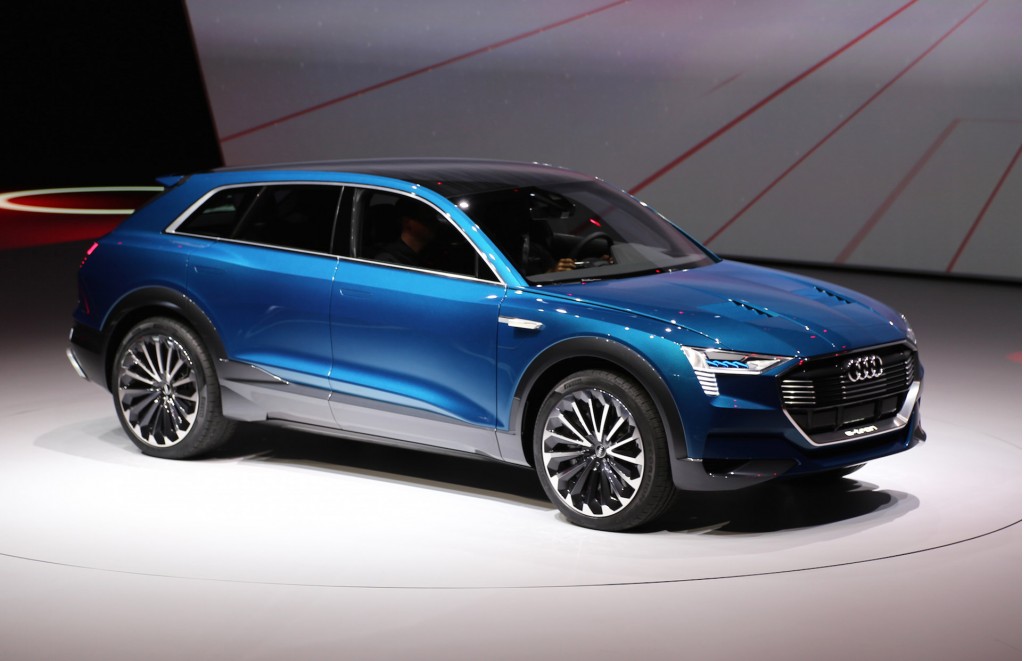It was an audacious statement, but there it was.
Audi expects that 25 percent of the cars it sells just 10 years hence will be either battery-electric or plug-in hybrid models.
And it came directly from Scott Keogh, president of Audi of America, in front of a packed media audience at the Los Angeles Auto Show.
DON'T MISS: Audi e-Tron Electric Car To Offer 150-kW Quick Charging Sites
Audi sold 1.7 million cars globally in 2014, of which 182,000 went to U.S. buyers. Assuming at least 2 million vehicles by then, that means the company would sell half a million electric or plug-in hybrid vehicles a year in 2025.
The public projection culminated an intensive week of activity by Audi to talk more openly and candidly about the addition of plug-in vehicles to its portfolio, and how it intends to roll them out over the next few years.
The media events were planned well before the Volkswagen diesel-emission scandal broke in mid-September, executives say, and reflect a public commitment by the second of Germany's luxury brands to commit to a broad program of electrified vehicles.

Audi e-tron quattro concept, 2015 Frankfurt Auto Show
Audi has said the production version of the all-electric Audi e-Tron Quattro Concept will go on sale in 2018.
And it is now releasing its first vehicle with a plug--the 2016 Audi A3 e-Tron Sportback plug-in hybrid, with a 16-mile electric range, which it says will go on sale nationwide--the first simultaneous full national roll-out of any plug-in vehicle.
ALSO SEE: Audi Q7 e-Tron 3.0 TDI Quattro: First Drive Of Diesel Plug-In Hybrid SUV
It will offer plug-in hybrid versions of many of its mainstream vehicles, including the large Q7 sport-utility vehicle and several sedan models.
And Keogh suggested that there will be additional battery-electric models beyond the production e-Tron Quattro crossover utility vehicle as well.

Audi Q7 e-Tron 3.0 TDI Quattro (European model), Madrid, Nov 2015
Perhaps most importantly, Audi said--without providing any specifics--that it plans to offer a DC quick-charging network operating at 150 kilowatts along with the 2018 launch of the e-Tron Quattro.
How it makes that happen, in conjunction with some of the other automakers using the Combined Charging Standard (CCS) quick-charging protocol, will be the challenge.
CHECK OUT: Audi To Add Plug-In Hybrid Models Of Next A6, A8 Sedans, Q7 SUV
The goal will be to offer a vehicle and a robust national charging network that at least equal the Tesla Model X crossover and the fast-growing global Supercharger network whose use is free to all Tesla Model S and Model X owners.
Asked how Audi might not only equal but surpass Tesla, executives said that the company is intently studying the entire suite of experiences, services, and ownership needs of electric cars.

2016 Audi A3 e-Tron Sportback, San Francisco Bay Area, Oct 2015
While they offered no specifics, company officials appeared relatively aware of some of the challenges and frustrations of early electric-car adopters--especially involving purchase at conventional franchised dealers.
As Audi joins BMW in a strong commitment to plug-in vehicles, now only Mercedes-Benz lags in public plans for battery-electric vehicles.
Meanwhile, expect more details about Audi's strategy, tactics, and vehicles to filter out over the next three years
Audi provided airfare, lodging, and meals to enable High Gear Media to bring you this first-person report.
_______________________________________













